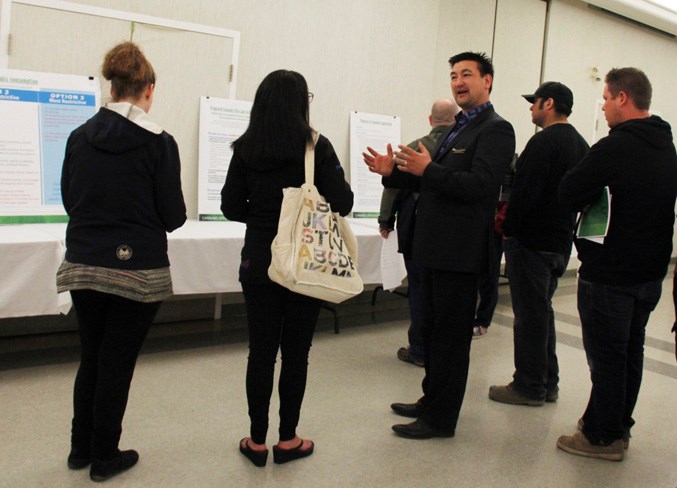Residents in the City of Cold Lake talked about the highs and lows of future cannabis use during an information open house.
On Tuesday, May 1, Cold Lake hosted an open house for residents to express their concerns and queries as the city gears up for the legalization of recreational cannabis.
According to CAO Kevin Nagoya, the city wanted to “provide some guidance and understanding as to whose jurisdiction cannabis falls in and what elements fall in the provincial, federal, and municipal jurisdiction.”
They’re hoping that by explaining each level of government’s part in the legalization and regulation process, residents will better understand the role the municipality has to play.
“We’re trying to limit the conversation, because this isn’t a debate as to whether we want to have recreational use of cannabis or not, because that’s kind of off the table. Once it’s decriminalized, that’s a federal government decriminalization perspective of legislation,” Nagoya expressed.
What the city wants to know is how restrictive residents want the bylaws to be.
“I think there are a lot of different opinions on this. We want to make sure the city has everybody’s comments, as much as it can, to get a lot of different perspectives,” said Nagoya.
For example, the city could take the restrictive route, and only allow cannabis use in a private residence. Or they could go the opposite direction and allow it anywhere they presently allow cigarette smoke.
Currently, the city is in favour of treating the drug like alcohol, allowing it to be purchased and smoked in the privacy of your own home.
For city resident Andrea Wanvig, as long as it’s being used away from children she will be happy.
“To each their own. It’s kind of like cigarette smoke, I don’t like it, it bothers me, but I think if it’s regulated similarly, that’s fine. It shouldn’t be around kids or public areas where there are kids,” she noted. “Realistically, cannabis was legal at one point in time, it’s a herb. There are medicinal properties in it. I’m okay with it, I just think they have to slowly release it. They need to restrict it to some point and slowly loosen the gate as it becomes more and more popular.”
Wanvig agrees with the city’s approach to reach out to as many residents as possible for feedback.
“You have a lot of different age groups who have different weigh-in. People in their 80s or older may have hesitation. If you’re dealing with baby boomers who lived through the 60s and 70s they have a different opinion on it. Kids now, millenniums, they’re a little more open to it,” Wanvig emphasized.
The open house also allowed residents to get a better understanding of where cannabis retail stores could be located.
Nagoya said for the most part, he felt residents agreed with having a setback from schools, playgrounds, and public spaces such as parks and Kinosoo Beach.
“I think a lot of people understand why there is a need for a setback. I think there is a general agreement that setbacks are important,” he added. “There are varying degrees in terms of what that setback should be, and it could be from one extreme to another, and that’s what we’re hearing.”
Lynn Owens, Cold Lake resident, wants to see recreational cannabis retail stores kept close together.
She explained, “I would like to see two of them in Cold Lake north or south altogether so the police don’t have any issues doing their job of policing them.”
She also hopes that by doing this, it will keep the drug out of the hands of youth.
Wanvig believes cannabis retailers should be treated like other businesses: fairly.
“The bylaw should, because you’re dealing with cannabis, address some of the issues that may arrive from a security standpoint. In those bylaws, if they’re developing a retail outlet, they need to maintain ample security,” she added. “That’s one of the biggest issues I think we have with liquor stores here in town, is constant break-ins and things like that. That would be my concern there.”
Owens suggested requiring stores to close at 10 p.m. on weeknights and midnight on weekends.
This is one of the reasons why the city hosted the open house, so they could garner feedback from varying opinions.
Surveys were available for people to fill out. Using the information shared and the perspectives collected, council will determine if they are headed in the right direction when it comes to regulating cannabis in the city limits.
So far, the land-use bylaw has received first reading.
“A public hearing is going to be held, so if people want to speak to it they can based on the education they receive at the open house,” Nagoya said, adding the public hearing is set for May 8.
He added, “I think this won’t be a simple one. I don’t think there will be a straight consensus in the community.”
Once council has held the public hearing, they will take all of the information they have and determine which direction they need to take.
“This is the first time we’re in the community. It may be required, depending on what council sees as a result of the conversations we have this evening, there may need to be more interactions with the public yet,” expressed Nagoya.



